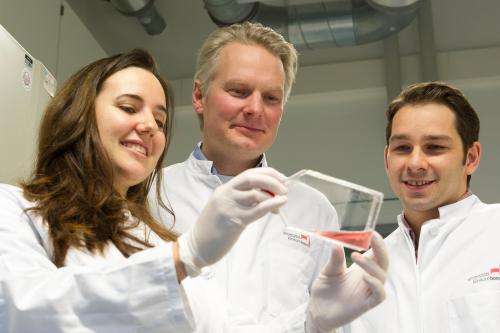How "good cholesterol" stops inflammation

High-density lipoprotein (HDL), known colloquially as "good cholesterol", protects against dangerous deposits in the arteries. An important function of HDL is its anti-inflammatory properties. An international research team at the Institute of Innate Immunity at the University Hospital of Bonn and the LIMES Institute at the University of Bonn has identified a central switch by which HDL controls the inflammatory response. The results are presented in the current issue of Nature Immunology.
High cholesterol levels are seen as a cause of dangerous deposits in the bloodstream, which lead to hardening of the arteries (atherosclerosis). As a consequence, thrombosis, strokes, and heart attacks can develop, which are among the leading causes of death in Western society. Low-density lipoprotein (LDL) is commonly referred to as the "bad cholesterol", because it promotes atherosclerosis. In contrast, the "good cholesterol," high-density lipoprotein (HDL), helps transport excess cholesterol out of the bloodstream and can counteract an inflammatory reaction in damaged vessel walls.
"It has long been known that HDL has a protective function in cardiovascular diseases that are based on atherosclerosis," reports Prof. Eicke Latz, Director of the Institute of Innate Immunity at the University of Bonn and who is further affiliated with the German Center for Neurodegenerative Diseases (DZNE) and the University of Massachusetts Medical School in the USA. "The molecular causes to which this protective effect of HDL can be attributed were unclear until now." For instance, studies had shown that therapies that simply increase HDL levels in the blood of patients are not sufficient to reduce the incidence of atherosclerosis. HDL has anti-inflammatory effects on immune cells – however the mechanisms have remained unclear until now. The research group has now investigated how HDL acts upon inflammatory processes.
Bioinformatics approach revealed a candidate gene
Principle investigators Dr. Dominic De Nardo and Larisa I. Labzin are both Australians currently training in the lab of Prof. Eicke Latz. In collaboration with other working groups of the University of Bonn, an international research team from Japan, Australia, China, the USA, and Germany has identified how HDL acts to prevent chronic inflammation. In a very extensive study over a period of about three years, the group performed experiments in human and mouse cells, to determine which genes are regulated by high HDL levels. "At first, we were really just feeling around in the dark," reports Prof. Latz. Close cooperation with the working group of Prof. Joachim L. Schultze of the Life and Medical Sciences (LIMES) Institute of the University of Bonn finally got the scientists on the right track. "With the aid of genomic and bioinformatics approaches, we were able to filter out a candidate gene from the wealth of regulated genes", adds Prof. Schultze.
This gene is found in phagocytes, which act in the body like police on the beat and, as part of the innate immune defense system, arrest intruders. These patrolmen are supported by a kind of "criminal file," the so-called Toll-like receptors (TLR). With their help, the phagocytes can distinguish between "good" and "bad." If it is a dangerous intruder, the TLR can also trigger the release of inflammatory substances via biochemical signaling pathways. The transcriptional regulator, ATF3, plays a key role in this process. "It reduces the transcription of the inflammatory genes and prevents further stimulation of inflammatory processes via the Toll-like receptors," explains Dr. Dominic De Nardo.
Sustained inflammatory reactions can lead to organ failure
The immune system uses inflammatory processes to keep pathogens in check, to detect damaged tissue, and then repair it. In sustained inflammatory reactions, however, there are dangerous consequences –including blood poisoning or organ failure. "The transcriptional regulator ATF3 acts to reduce these inflammatory reactions by suppressing the activation of inflammatory genes following excessive stimulation of immunoreceptors", reports Dr. De Nardo. In the end, high-density lipoprotein (HDL) is responsible for down regulating the inflammatory reactions, via the activation of ATF3. "To put it simply, high HDL levels in blood are an important protective factor against sustained inflammation," says Prof. Latz.
"Our studies also indicate that the amount of HDL in blood alone is not decisive for the protective function of HDL, but that the anti-inflammatory function is probably more important. These results also suggest a molecular approach for treating inflammation in other widespread diseases, such as diabetes," says Prof. Latz.
More information: High-density lipoprotein mediates anti-inflammatory reprogramming of macrophages via the transcriptional regulator ATF3, Nature Immunology, DOI: 10.1038/ni.2784















